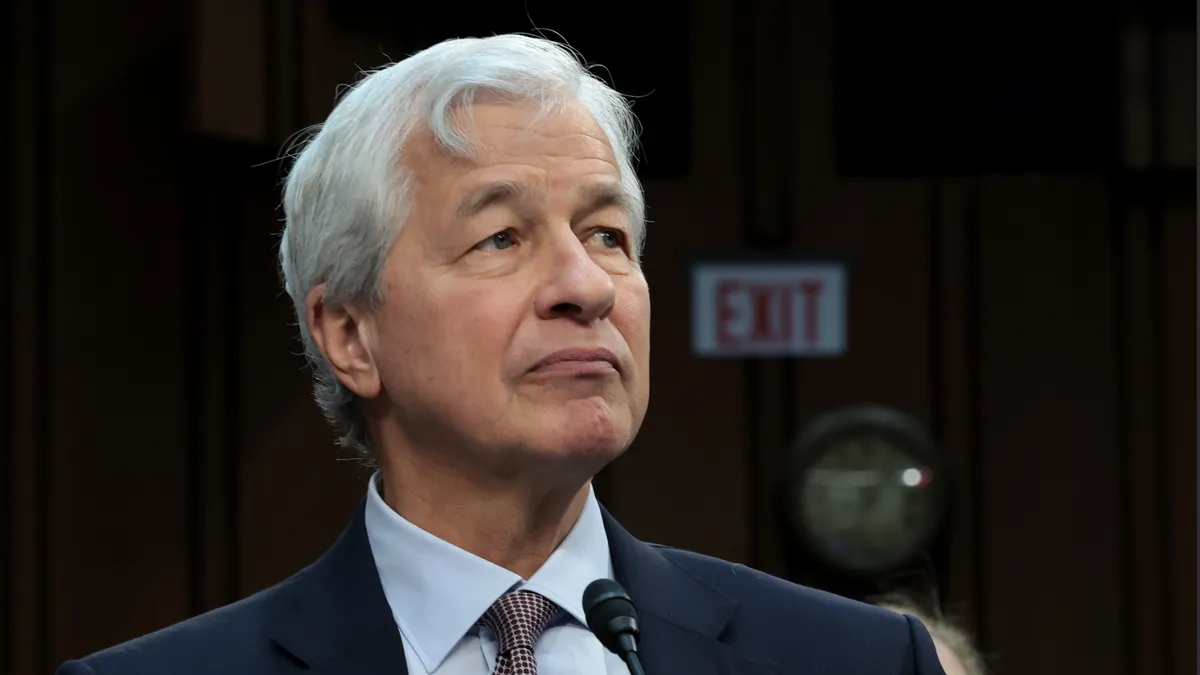Dive Brief:
- JPMorgan Chase CEO Jamie Dimon called for “a serious review” of the bank regulatory and supervisory process in his annual letter to shareholders Monday. He also noted deteriorating relationships between banks and regulators as banks’ regulatory requirements have increased.
- Dimon, who has been critical of tougher capital requirements, said Basel III endgame rules “are flawed and poorly calibrated.” “Much of the work being done today to analyze the effects should have been done before the proposed rulemaking,” Dimon lamented.
- In his wide-ranging, 60-page letter, Dimon also called out the “undue influence” of proxy advisers Institutional Shareholder Services and Glass Lewis, and addressed the potential of artificial intelligence, which he deemed “possibly as transformational” as the printing press or electricity.
Dive Insight:
In last year’s letter, just after the collapse of Signature and Silicon Valley Bank, Dimon warned against reactionary regulations and called for a collaborative approach to regulation.
He renewed that call in Monday’s letter. Over time, relationships between regulators and bank management and boards have deteriorated and “are increasingly less constructive,” Dimon asserted.
Improved relations between banks and regulators would reduce confusion and uncertainty and result in better outcomes for banks, their shareholders and their clients, he wrote. Without collaboration and analysis, “it is hard to be confident that regulation will accomplish desired outcomes without undesirable consequences,” Dimon wrote. “Instead of constantly improving the system, we may be making it worse.”
He pointed to the thousands of rules and reporting requirements added by at least 10 regulators since the 2010 Dodd-Frank Act — some of which “are duplicative, inconsistent, procyclical, contradictory, extremely costly and unnecessarily painful for both banks and regulators,” he argued.
Dimon expressed a desire for a thorough and candid review of those rules, as they’ve required increased attention from banks and regulators. Smaller and regional banks, in particular, may have a tougher time shouldering regulatory requirements, he noted.
Bank management teams “are putting in a disproportionate amount of time addressing requests for extra details, documentation and processes that extend far beyond the actual rules — and distract both regulators and management from more critical work,” Dimon wrote. In his eyes, that more critical work relates to risks posed by China, trade, payment systems and cybersecurity.
In the letter, Dimon also opined on proxy advisers, “the spiraling frivolousness” of annual shareholder meetings and the shrinking public markets.
He expressed a fear that companies are being driven from the public markets for a slew of reasons, including more intense reporting requirements and the growing demand for ESG information, litigation expenses, regulatory costs, shareholder activism, less flexibility with compensation and capital, heightened public scrutiny “and the relentless pressure of quarterly earnings.” JPMorgan reports first-quarter earnings Friday.
Corporate governance “is evolving away from guidance by governance principles that focus on a company’s relationship to long-term economic value [and] toward a bureaucratic compliance exercise,” Dimon asserted.
In calling out the excessive influence of proxy advisers ISS and Glass Lewis, Dimon said those firms initially provided a trove of company data to help their institutional investor clients vote on proxy matters, but soon began offering advice on how shareholders should vote on proxy matters.
Dimon also noted the firms’ foreign ownership — ISS is owned by Deutsche Boerse, and Glass Lewis by Canadian private-equity firm Peloton Capital — and questioned “whether American corporate governance should be determined by for-profit international institutions that may have their own strong feelings about what constitutes good corporate governance.”
To minimize the influence of recommendations from such proxy advisers, JPMorgan Asset Management aims to eliminate third-party proxy adviser voting recommendations from its internally developed voting systems by the end of this year, Dimon wrote.
Dimon also devoted prominent space in his letter to artificial intelligence, the impact of which may be one of the most important issues facing the bank, he said. The lender’s AI organization has about 2,000 AI/machine learning experts and data scientists, and JPMorgan has about 400 predictive AI/ML use cases in areas like marketing, fraud and risk, he noted.
The bank is also exploring generative AI’s potential impact in software engineering, customer service and operations, “as well as in general employee productivity,” Dimon wrote.
“Over time, we anticipate that our use of AI has the potential to augment virtually every job, as well as impact our workforce composition,” he wrote. “It may reduce certain job categories or roles, but it may create others as well.”
Dimon pledged that JPMorgan would “aggressively retrain and redeploy our talent to make sure we are taking care of our employees if they are affected by this trend.”
The CEO also weighed in on the geopolitical climate and expressed caution with regard to the economic outlook, warning of “stickier inflation and higher rates than markets expect.”











